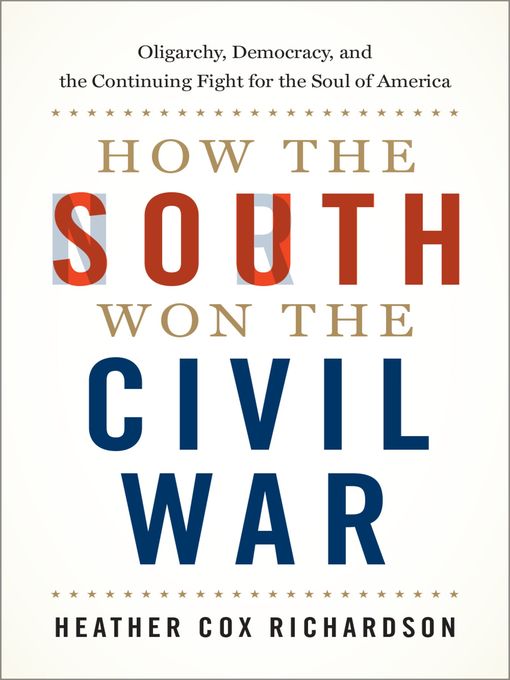
How the South Won the Civil War
Oligarchy, Democracy, and the Continuing Fight for the Soul of America
کتاب های مرتبط
- اطلاعات
- نقد و بررسی
- دیدگاه کاربران
نقد و بررسی

February 17, 2020
In this incisive, politically minded history, Boston College professor Richardson (West from Appomattox) argues that Barry Goldwater’s “movement conservatism”—which she claims has overtaken the Republican Party during the past 50 years—“embrace the same ideas” that undergirded slavery and sparked the Civil War. Tracing the origins of those beliefs to the “great paradox” of America’s founding documents (”the concept that ‘all men are created equal’ depended on the idea that the ringing phrase ‘all men’ did not actually include everyone”), Richardson contends that throughout U.S. history, wealthy white men have enhanced and enshrined their power by stoking the fears of poor and working-class white men that women and minorities are poised to become their equals. She documents how post-Reconstruction settlement shaped the West, building an economy based on resource extraction (just like the antebellum South); tracks the formation of political alliances between Western and Southern conservatives; and concludes that Donald Trump’s cultivation of white supremacist support has “stripped off whatever genteel veneer remained on Republican ideology.” Though Richardson underemphasizes the prevalence of racism, sexism, and inequality in other parts of the country during and following the Civil War, she marshals a wealth of evidence to support the book’s provocative title. Conservatives will cry foul, but liberal readers will be persuaded by this lucid jeremiad.

Starred review from April 1, 2020
The United States was founded on a paradox in which equality depended on the inequality of race, class, and gender. Conversely, wealthy white men, in order to reassert oligarchic rule, have used the language of freedom to convince themselves that if people of different races or classes enjoyed the same rights, or if women developed more political authority, it would undermine the very freedoms upon which America is built. In clearly written prose, Richardson (history, Boston Coll.; To Make Men Free) argues that the appeals to freedom and rights used today are the same as those used by Southerners prior to the Civil War. The main difference is that women and people of color are now full members of society. Employing an array of sources, the author traces the history of inequality from the U.S founding through the election of President Trump, paying special attention to westward expansion and the ongoing influence Southerners had on national politics and government. VERDICT Those interested in American history, politics, and its historical development will find much to enjoy in this well-written, argued work.--Chad E. Statler, Westlake Porter P.L., Westlake, OH
Copyright 2020 Library Journal, LLC Used with permission.

February 1, 2020
A thought-provoking study of the centuries-spanning battle between oligarchy and equality in America. In 1860, writes Richardson (History/Boston Coll.; To Make Men Free: A History of the Republican Party, 2014, etc.), the Republican Party took pains in its platform to remind audiences of the Declaration of Independence and its assertion that "all men are created equal." All men were not equal, of course, to say nothing of women, who would not gain the right to vote for another three generations. Still, the Republicans opposed a slave system that they regarded as despotic while Southern true believers held that a small elite formed a proper polity all their own, slave owners who "would resolve the American paradox by shearing off the portion of it that endorsed equality." It was this radical rejection of a founding premise, however imperfectly applied, that distinguished Republicans and Southern Democrats. By Richardson's account, it is this radical rejection that, the party roles having reversed polarity a century later, distinguishes Republicans from Democrats, the former of whom now possess "the language they need to undermine our democracy, and to replace it with an oligarchy." Furthermore, they believed that "their new system made their nation different from the Old World, which was split between a corrupt aristocracy and the lazy poor." In their view, a corrupt aristocracy was fine as long as it did not have to share spoils or power; of course, the common trope among Republicans these days is that if you're poor, it's because you choose to be. Nixon's "Southern strategy" did much to propel neo-Confederate values into the modern Republican Party. Later, Newt Gingrich enshrined them, fortifying class inequality by placing "tax cuts at the center of Republican policy" and reducing political interference by changing lawmaking so that lobbyists--not representatives--wrote regulations and laws that "were designed to put the American government at the service of democracy." A powerful case for viewing the unfinished Civil War as a Confederate victory after all.
COPYRIGHT(2020) Kirkus Reviews, ALL RIGHTS RESERVED.

























دیدگاه کاربران